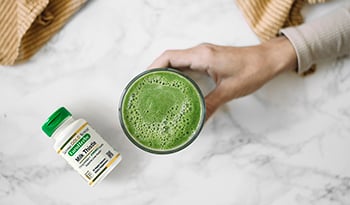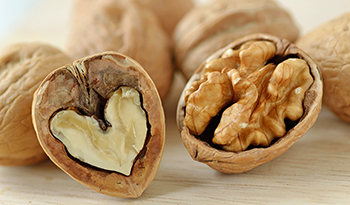Ostati zdrav u tijelu i umu: nekoliko savjeta za Novu godinu

Dobro zdravlje proizlazi iz pravilne prehrane, redovitog vježbanja, dobrog sna i pronalaženja održive ravnoteže između obveza rada i škole te zadovoljstva i zadovoljstva koji proizlaze iz zdravih odnosa, obavljanja posla koji je korisno i drugih svakodnevnih aktivnosti koje život čine smislenim, poticajnim i zanimljivim. Ljudima koji se bore s problemom zlouporabe supstanci ili depresivnim raspoloženjem zimski mjeseci smatraju posebno izazovnim.
Ovaj se post nudi kao sažet pregled nalaza istraživanja o prednostima dobre prehrane, redovitog vježbanja i mirnog sna za mentalno zdravlje. Također pregledam nalaze o S-adenosil metioninu (SAMe) i dehidroepiandrosteronu (DHEA), 2 prirodna dodatka koji imaju antidepresivne prednosti.
Zdrava prehrana - bitna komponenta dobrog mentalnog zdravlja
Istraživanja su utvrdila da dobra prehrana poboljšava mentalno i emocionalno blagostanje. Nedostaci određenih vitamina B kao što su folat i B-12, omega-3 masne kiseline, vitamin D, cinki magnezij povezani su s povećanim rizikom od depresivnog raspoloženja. Hrana bogata vitaminima B, poput cjelovitih žitarica i tamnozelenog lisnatog povrća, može biti posebno učinkovita protiv depresivnog raspoloženja. Neki vitamini B funkcioniraju kao enzimski kofaktori koji olakšavaju sintezu neurotransmitera uključenih u regulaciju raspoloženja kao što su serotonin, dopamin i norepinefrin. Druge prirodne tvari poput cinka, magnezija i omega-3 masnih kiselina potiču povećanu sintezu neurotrofnog faktora izvedenog iz mozga (BDNF) koji povećava neuroplastičnost, što rezultira većom otpornošću mozga suočenim sa stresom i smanjenim rizikom od razvoja depresivnog raspoloženja.
Omega-3 i neki vitamini B imaju blagotvornu protuupalnu i neuroprotektivnu ulogu, što može pridonijeti njihovim učincima na poboljšanje raspoloženja. Nedavni sustavni pregled identificirao je 12 esencijalnih hranjivih tvari koje ispunjavaju kriterije za djelotvornost antidepresiva: folat, željezo, dugolančane omega-3 masne kiseline (EPA, DHA), magnezij, kalij, selen, vitamin A, vitamin B6, vitamin B12, vitamin Ci cink. Koristeći bazu podataka FDA, autori su identificirali hranu s najvećim sadržajem barem jedne od ovih hranjivih tvari. Hrana s najvećom antidepresivnom učinkovitošću uključivala je kamenice i dagnje, ostale plodove mora, meso organa, lisnato zelje, salatu, papriku i križasto povrće poput brokule, cvjetače, kupusa, kelja i prokulica.
Nalazi epidemioloških studija potvrđuju da pojedinci koji konzumiraju cjelovitu hranu - za razliku od prerađene hrane i prehrane brze hrane - imaju smanjen rizik od razvoja depresivnog raspoloženja. Na primjer, pojedinci koji slijede mediteransku prehranu ili tradicionalne prehrambene preferencije u Norveškoj, Japanu i Kini, a svi su bogati povrćem i ribom, imaju 30% manji rizik od razvoja depresivnog raspoloženja od pojedinaca s najnižom stopom pridržavanja mediteranske prehrane. Dok mediteranska prehrana i druge tradicionalne prehrane naglašavaju gore navedene namirnice, prosječna američka prehrana relativno nedostaje hrane bogate hranjivim tvarima koja može imati antidepresivne koristi. Preferencije hrane koje utječu na potrošnju masnih kiselina mogu biti izravno povezane s različitim stopama depresivnog raspoloženja kada se industrijalizirane zemlje uspoređuju s tradicionalnijim kulturama. Epidemiološke studije ukazuju na to da postoji obrnuta povezanost između rizika od depresivnog raspoloženja i konzumacije ribljeg ulja. Zemlje, u kojima je riba važan dio prosječne prehrane, karakteriziraju znatno niže stope depresivnog raspoloženja i suicidalnosti. Na primjer, u Japanu, gdje je konzumacija ribe vrlo visoka, samo 0,12% stanovništva doživljava depresivno raspoloženje u određenoj godini. Nasuprot tome, Novozelanđani, koji konzumiraju relativno malo ribe, prijavljuju godišnju stopu depresije od 6%.
Osim prednosti specifičnih prirodnih dodataka za mentalno zdravlje, postoje novi dokazi da mikrobiom- koji se sastoji od mikroorganizama koji naseljavaju veliko i tanko crijevo - doprinosi općem fizičkom i mentalnom zdravlju kroz različite mehanizme, od kojih neki mogu utjecati na neurotransmitere i upalne molekule uključene u regulaciju raspoloženja.
Mirno spavanje važno je za dobro mentalno zdravlje
Kronično prekinuti san može imati značajne negativne posljedice na raspoloženje i kognitivno funkcioniranje. Pristupi uma i tijela utvrđeni kao korisni za nesanicu uključuju progresivno opuštanje mišića, meditaciju, vođene slike i hipnozu. Progresivno opuštanje mišića i dugotrajno duboko disanje posebno su učinkoviti za smanjenje vremena potrebnog za spavanje kod osoba s kroničnom nesanicom. Tehnike koje promiču duboku relaksaciju povećavaju parasimpatičku aktivnost (tj. Dio autonomnog živčanog sustava koji usporava srce i smiruje um) i smanjuju simpatičku aktivnost (tj. dio autonomnog živčanog sustava koji povećava broj otkucaja srca i pojačava budnost). Pojedinci koji imaju problema sa zaspavanjem zbog tjeskobe ili stresa na poslu mogu imati koristi od slušanja opuštajućih slika koje sadrže zvukove prirode počevši 30 minuta prije uobičajenog spavanja. Pojedinci koji imaju problema sa spavanjem povezanih s kroničnom boli ili drugim medicinskim problemom često reagiraju na progresivno opuštanje mišića, a oni koji ostanu budni zbog kronične zabrinutosti vjerojatnije će postići miran san uz vođene slike.
Kognitivni pristupi opuštanju poput meditacije i vođenih slika vjerojatno su učinkovitiji od progresivnog opuštanja mišića za blagu ili situacijsku nesanicu, ali su od male koristi za tešku nesanicu (Nacionalni institut za procjenu zdravstvene tehnologije, 1996.). Pojedinci s kroničnim poremećajima boli kao što su fibromialgija ili artritis prijavljuju značajno povećanje trajanja sna i smanjenu bol redovitom masažnom terapijom. Pojedinci s kroničnom nesanicom koji dosljedno prakticiraju kognitivno-bihevioralnu tehniku sami ili u kombinaciji s benzodiazepinom ili drugim sedativno-hipnotičkim lijekom izvještavaju da su nefarmakološki ili kombinirani pristupi učinkovitiji od samih lijekova. Nadalje, poboljšani san održava se duže kod pojedinaca koji koriste nefarmakološke ili integrativne pristupe u usporedbi samo s lijekovima. Metaanaliza 66 studija (uključujući približno 2000 pacijenata) opuštanja i pristupa uma i tijela za nesanicu zaključila je da su sve ispitane intervencije rezultirale "pouzdanim i trajnim prednostima" koje su bile superiornije od placeba, uključujući poboljšanu kvalitetu sna i skraćeno vrijeme potrebno za zaspanje. Zasebna meta-analiza otkrila je da iako su nefarmakološki tretmani kronične nesanice u početku skuplji i zahtijevaju više vremena u usporedbi s konvencionalnom terapijom lijekovima, dugoročno su pouzdani, rezultiraju trajnim koristima i isplativiji su od samih lijekova.
Mnogi pojedinci koji se bore s kroničnom nesanicom postaju ovisni o benzodiazepinima kao što su lorazepam (AtivanTM), diazepam (ValiumTM) i klonazepam (KlonopinTM). Uzimanje melatonina može olakšati prekid primjene benzodiazepina nakon kronične primjene, međutim nalazi su nedosljedni. U 12-tjednom jednoslijepom placebom kontroliranom ispitivanju, osobe koje su primale 2 mg melatonina s kontroliranim oslobađanjem imale su veću vjerojatnost da će prestati uzimati benzodiazepine u usporedbi s onima koji su uzimali placebo. Pojedinci koji su uzimali melatonin prijavili su značajno veće poboljšanje kvalitete sna u usporedbi s placebo skupinom, a većina onih koji su nastavili uzimati melatonin s kontroliranim oslobađanjem noću ostali su bez benzodiazepina šest mjeseci nakon završetka studije. Za razliku od gore navedenih pozitivnih nalaza, noviji sustavni pregled i metaanaliza nisu pronašli dokaze da melatonin olakšava prekid uzimanja benzodiazepina i nedosljedne učinke melatonina na kvalitetu sna.
Antidepresivne prednosti redovitog vježbanja
Mnogi ljudi koji se bore s depresivnim raspoloženjem smatraju jesenskim i zimskim mjesecima posebno izazovnim. Iako su dostupni uobičajeni tretmani poput lijekova i psihoterapije često korisni, postojeći konvencionalni pristupi u mnogim slučajevima ne uspijevaju ublažiti depresivno raspoloženje. U nastavku dajem sažet sažetak istaknutih istraživanja koji podržavaju prednosti redovitog vježbanja koje poboljšavaju raspoloženje i odabiru prirodnih dodataka.
Nalazi kontroliranih ispitivanja i sustavnih pregleda utvrdili su da redovita tjelovježba poboljšava depresivno raspoloženje. Pojedinci koji su manje sjedeći imaju smanjeni rizik od depresivnog raspoloženja i kardiovaskularnih bolesti. Neposredni i dugoročni blagotvorni učinci vježbanja na raspoloženje posredovani su višestrukim čimbenicima koji povećavaju razinu endorfina, dopamina, norepinefrina i serotonina u mozgu, potiču razvoj novih neurona u mozgu (tj. Neurogenezu), smanjuju oksidativni stres i poboljšavaju imunološko funkcioniranje. Nalazi male pilot studije fMRI sugeriraju da redovita tjelovježba može potaknuti povećanu neuroplastičnost u određenim regijama mozga, što može rezultirati poboljšanjem raspoloženja.
Metaanaliza kontroliranih studija (ukupno 977 ispitanika) o vježbanju korištenom ili kao pojedinačna intervencija ili u kombinaciji s antidepresivima izvijestila je da redovita tjelovježba ima dosljedne blagotvorne učinke na depresivno raspoloženje. Sustavni pregled studija o vježbanju kao dodatnoj terapiji kod osoba s dijagnozom velikog depresivnog poremećaja otkrio je da depresivni pojedinci koji redovito vježbaju reagiraju dosljedno bolje od pojedinaca koji uzimaju antidepresiv, ali ne vježbaju. Redovita aerobna tjelovježba može poboljšati kognitivno funkcioniranje kod kronično depresivnih osoba koje često imaju poteškoća s razmišljanjem i pamćenjem. Redovita tjelovježba također poboljšava kvalitetu sna kod osoba koje ne reagiraju na antidepresive. To može biti značajna korist vježbanja za ukupnu otpornost i svakodnevno funkcioniranje s obzirom na visoku stopu prevalencije nesanice kod kronično depresivnih osoba. Potrebno je više studija kako bi se utvrdilo optimalno trajanje i učestalost vježbanja za poboljšanje depresivnog raspoloženja.
SAMe i DHEA- Dva dodatka s utvrđenom učinkovitošću za depresivno raspoloženje
Primjeri empirijski potvrđenih prirodnih proizvoda tretmana depresivnog raspoloženja uključuju gospinu travu, S-adenosil metionin (SAMe), aminokiselinu 5-hidroksitriptofan (5-HTP), l-metilfolat-oblik vitamina B folne kiseline, esencijalne masne kiseline eikozapentaenoične kiseline (EPA), a u manjoj mjeri aminokiselina acetil-L-karnitin i prohormon dehidroepiandrosteron (DHEA). Placebom kontrolirane dvostruko slijepe studije i metaanalize pokazuju da SAMe ima ekvivalentnu ili superiornu antidepresivnu učinkovitost u usporedbi s tricikličkim antidepresivima.
Meta-analize placebom kontroliranih studija pokazuju da je donor metila S-adenozilmetionin (SAMe) jednako učinkovit kao i široko propisani antidepresivi kada se uzimaju sami i poboljšava ukupni odgovor i može ubrzati odgovor kada se uzima s antidepresivom. Važna studija objavljena u American Journal of Psychiatry izvijestila je da SAMe također može imati značajne koristi za poboljšanje raspoloženja kod pojedinaca koji ne reagiraju na antidepresive. Kombinacija SAMe s antidepresivom siguran je integrativni način liječenja depresivnog raspoloženja koji može omogućiti pacijentima da smanje dozu antidepresiva na recept za čak 30% u nekim slučajevima. Osim poboljšanja učinkovitosti antidepresiva, postoje dokazi da dodatna primjena SAMe može smanjiti seksualne nuspojave koje često uzrokuju SSRI i drugi antidepresivi. Konačno, uzimanje SAMe 400 mg dva puta dnevno zajedno s antidepresivom može poboljšati pamćenje i druge kognitivne probleme koji često prate depresivno raspoloženje.
Kao i SAMe, neurosteroid dehidroepiandrosteron (DHEA) uzet sam može smanjiti težinu depresivnog raspoloženja i može se sigurno koristiti zajedno s antidepresivima povećavajući njihovu učinkovitost. Razina DHEA u tijelu i mozgu opada s normalnim starenjem, što može pomoći u objašnjenju nekih slučajeva depresije kasnog početka. Mnogi pojedinci koji reagiraju na DHEA prijavljuju i poboljšanja u seksualnom funkcioniranju.
Reference:
- Dome P, Tombor L, Lazary J, Gonda X, Rihmer Z. (2019) Prirodni zdravstveni proizvodi, prehrambeni minerali i lijekovi bez recepta kao dodatna terapija antidepresivima u liječenju velikog depresivnog poremećaja: pregled. Brain Res Bull 146:51-78.
- LaChance LR, Ramsey D. (2018) Antidepresivna hrana: sustav profiliranja hranjivih tvari temeljen na dokazima za depresiju. Svijet J Psihijatrija. 20; 8 (3): 97-104.
- Integracija pristupa ponašanja i opuštanja u liječenje kronične boli i nesanice. NIH tehnološki panel za procjenu za integraciju pristupa ponašanja i opuštanja u liječenje kronične boli i nesanice. JAMA. 1996. od 24. do 31. srpnja; 276 (4): 313-8.
- Field T, Diego M, Cullen C, Hernandez-Reif M, et al (2002) .Bol u fibromialgiji i supstanca P smanjuju se, a san se poboljšava nakon terapije masažom. J Clin reumatol. 8 (2): 72-6.
- Morin CM, Colecchi C, Stone J, Sood R, Brink D. (1999) Bihevioralne i farmakološke terapije za nesanicu u kasnom životu: randomizirano kontrolirano ispitivanje. JAMA. 17; 281 (11) :991-9.
- Murtagh DR, Greenwood KM. (1995) Identificiranje učinkovitih psiholoških tretmana za nesanicu: meta-analiza. J Consult Clin Psychol. 1995. veljača; 63 (1): 79-89.
- Morin CM, Culbert JP, Schwartz SM. (1994) Nefarmakološke intervencije za nesanicu: meta-analiza učinkovitosti liječenja. Am J Psihijatrija. 151 (8): 1172-80.
- Garfinkel D, Zisapel N, Wainstein J, Laudon M (1999) Olakšavanje prekida benzodiazepina melatoninom: novi klinički pristup. Arch Intern Med. 8; 159 (20) :2456-60.
- Wright A, Diebold J, Otal J, Stoneman C, Wong J, et al (2015) Učinak melatonina na prekid uzimanja benzodiazepina i kvalitetu sna kod odraslih koji pokušavaju prekinuti uzimanje benzodiazepina: sustavni pregled i meta-analiza. Lijekovi Starenje.; 32 (12): 1009-18.
- Schuch F, Vancampfort D, Firth J, Rosenbaum S, Ward P, et al (2017) Tjelesna aktivnost i sjedeće ponašanje kod osoba s velikim depresivnim poremećajem: sustavni pregled i meta-analiza. J Poremećaj utjecaja. 1; 210:139-150.
- Gourgouvelis J, Yielder P, Murphy B. (2017) Vježba promiče neuroplastičnost i u zdravom i u depresivnom mozgu: pilot studija fMRI. Neuralna plastika.
- Kvam S, Kleppe CL, Nordhus IH, Hovland A. (2016) Vježba kao tretman depresije: meta-analiza. J Poremećaj utjecaja. 15; 202:67-86.
- Mura G, Moro MF, Patten SB, Carta MG. (2014) Vježba kao dodatna strategija za liječenje velikog depresivnog poremećaja: sustavni pregled. CNS Spectr.; 19 (6): 496-508.
- Oertel-Knöchel V, Mehler P, Thiel C, Steinbrecher K, Malchow B, et al (2014) .Učinci aerobne vježbe na kognitivne performanse i individualnu psihopatologiju kod pacijenata s depresijom i shizofrenijom.
- Eur Arch Psychiatry Clin Neurosci. 264 (7): 589-604.
- Rethorst CD, Sunderajan P, Greer TL, Grannemann BD, Nakonezny PA, et al (2012) .Poboljšava li vježbanje kvalitetu sna koji se prijavljuje kod velikog depresivnog poremećaja koji se ne smije?
- Psihol Med.; 43 (4): 699-709.
ODRICANJE OD ODGOVORNOSTI: Ovaj Wellness kutak nije namijenjen za pružanje dijagnoza...

















































































 Sadržaj
Sadržaj















